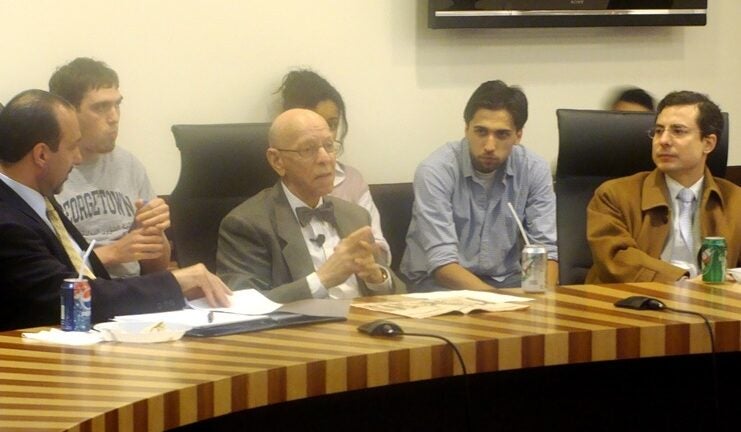American Studies, Dialogue Series, Regional Studies
The Euro's Future in the Balance

Ibrahim Oweiss, Professor Emeritus of Economics at Georgetown University, delivered a lunch time lecture on February 10, 2011 on the subject of “The Euro’s Future in the Balance.” Oweiss was one of the founding members of Georgetown University Center for Contemporary Arab Studies, and also spent four years on the faculty of the School of Foreign Service in Qatar.
Basing his lecture on the question “what are the possible scenarios for the Euro’s future?” Oweiss explored the ways in which the Euro has shaped and will continue to shape the economies of the European Union countries. Although the Eurozone is a significant economic region of the world and has a combined population that exceeds that of the United States, the recent bailouts of Ireland and Greece by Germany have indicated a serious weakness in the zone’s strategy. “The future of the European unification project is on life support, while Germany’s fingers are on the power switch,” he said. Indeed, because “Germany has the only healthy economy in Europe,” Oweiss argued, “either all of the sovereign debts of Europe become German public debt or the Euro will collapse.”
Many of the Eurozone countries have adopted the Euro as their sole legal tender, while others, such as the UK, are members of the European Union, but have opted out of the Euro. “The Monetary policy of the Eurozone is the responsibility of the European Central Bank, though there is no common representation, governors, or fiscal policy for the currency union.” There needs to be cooperation between these elements “in order to help smooth fluctuations in the business cycle” and so this is represents a major weakness related to the Euro. “There is,” however, “some cooperation which takes place through the Euro Group, which makes political decisions regarding the Eurozone and the Euro.”
Before taking questions from the audience, Oweiss concluded that regardless of the negative of the economies of the Eurozone, the Euro will remain one of the world’s key currencies. When asked whether or not Eurozone countries could opt out of the Euro and return to their former currencies, Oweiss argued that although it was possible, it is unlikely. Finally, he argued that he does not expect the Euro to collapse as long as Germany holds onto the Euro and doesn’t return to the Deutsch mark.
As an international economic advisor, Oweiss worked for several governments and multinational corporations. He has authored over fifty scholarly publications including:Petrodollar Surpluses, Arab Civilization, and The Political Economy of Contemporary Egypt.
Article by Suzi Mirgani, CIRS Publications Coordinator